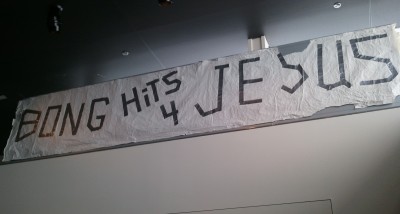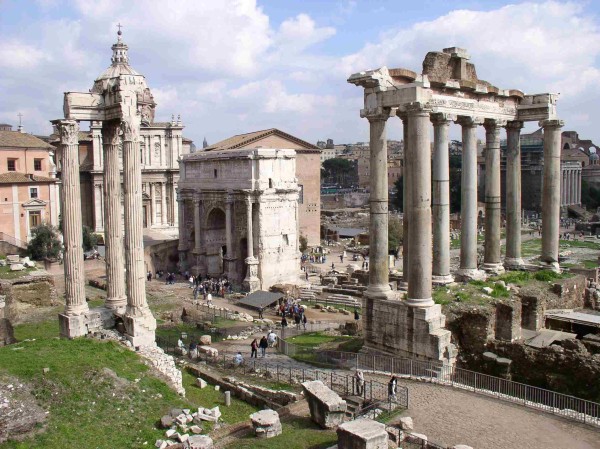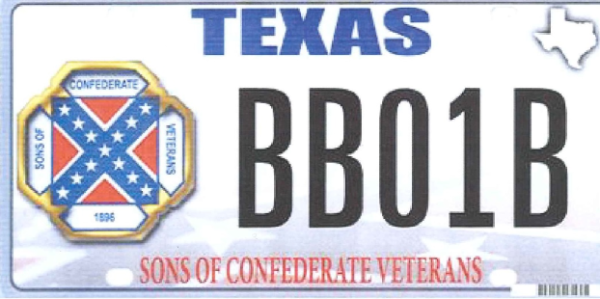Two months ago I began a blog post series about my recent visit to the Supreme Court for oral arguments in two cases. San Francisco v. Sheehan concerned police use of force in San Francisco; Walker v. Texas Division, Sons of Confederate Veterans concerned Texas’s specialty license plate program and its restrictions on permissible designs. Seven weeks ago I discussed oral argument in the Texas license plate case. Today I return for final thoughts on the Texas license plate case, in which a decision is expected any day now — perhaps even in an hour today.
(Why the seven-week delay when I’d promised merely “a day or two”? The day of the last post, I underwent [relatively] minor surgery for pain from a high ankle sprain, that hadn’t fully responded to approaches short of arthroscopic ankle surgery. [The surgery seems to have been successful, but I probably can’t be sure til I regain full ankle flexibility/strength. I can walk almost entirely normally now, but strength and flexibility are still noticeably diminished, albeit improving daily.] Although I had spare time immediately afterward, I wasn’t particularly inclined to post-writing, and as time passed I never got back in the groove. Time winding down before the ultimate opinion has put me back on track. 🙂 )
Back to forum analysis
Before I tackled oral argument, my previous posts discussed offensive speech. I left one question hanging: what sort of forum is Texas’s specialty license plate program? Is it a designated public forum or a limited public forum?
This turns out not to matter. To judge offensiveness requires adopting a particular viewpoint, but regardless which sort of forum Texas specialty plates are, restrictions must be viewpoint-neutral. As for Texas’s argument that judging offensiveness is “objective” and viewpoint-neutral, this plainly must fall in light of the Court’s repeated insistence that “the government may not prohibit the expression of an idea simply because society finds the idea itself offensive”.
Censoring based on offensiveness is not viewpoint-neutral. But in either a designated public forum or a limited public forum, restrictions must be viewpoint-neutral. So it doesn’t matter which Texas’s program is: prohibitions based on offensiveness must fall.
My opinion
On Texas
If you’ve paid any attention to this series, it should be obvious that I think Texas must lose. When Texas opened up a forum for speech on plates and invited essentially everyone onto them, they lost control over what can be said there. An amicus brief from the Rutherford Institute best captures my thoughts on this case. (Which isn’t to say I disagree with other briefs supporting Texas SCV, simply that the approach here best matches my reasoning.)
Other specialty plate programs
So much for Texas’s program. What about programs in other states? Such disputes previously have centered on Confederate flags (by other SCV divisions), but perhaps the most prominent topic of controversy has been adoption/abortion/pro-life/pro-choice advocacy. Some states have explicitly ordered designs taking sides in that controversy, or have approved such designs submitted by private parties. Inevitably the other side files suit for a chance to say its piece. What should happen? I think it depends on the contours of the program.
If a state legislature passes a law ordering a design be produced, or delegating that to the state DMV, that legitimately does seem to me to be government speech. Private parties have no right to butt in to demand alternative designs. The place to challenge such programs is in the voting booth, not the courthouse. The same is true if privately-submitted designs receive legislative approval in a pick-and-choose process: the available designs are government speech (although the designs themselves may be hybrid speech).
On the other hand, if a state provides a specialty plate program in which private parties may request designs, and those designs aren’t explicitly limited to particular topics, the specialty plate program is a designated public forum in which permitted private parties can say whatever they want. (Subject to the usual traditional public forum restrictions.) (This is Texas’s program.)
If the state provides an open program with restrictions, then we have a limited public forum. A specialty plate program along these lines might or might not be able to exclude speakers. For example, many Texas designs recognize particular colleges. A state program allowing only colleges to submit designs, consisting of a color scheme and a logo, wouldn’t be required to accept a specialty plate on some other topic, or from a non-college. A specialty plate program that allowed, say, “non-political” designs only would be a much closer question that would probably swing the other way. (Who’s to say what’s political and what isn’t, “viewpoint-neutrally”?) But if criteria were objective and viewpoint-neutral, restrictions might be permissible.
Justice Kennedy’s concern that striking Texas’s program “curtails” speech
One slightly disconcerting moment at oral argument came after Texas SCV argued that Texas pretty much couldn’t prohibit anything on specialty plates. With minor adjustments for readability:
- Justice Scalia
- So you’re — you’re really arguing for the abolition of Texas specialty plates, aren’t you? I couldn’t make a better argument for — in that direction than — than what you’ve been doing.
- Mr. George
- Well, we had got along without it a long time before we got it, and we can get along without it again.
- Justice Kennedy
- So in a way, your argument curtails speech?
I’m not sure whether this ever received an answer. But the answer I’d have given is simple: “We call Texas’s bluff.” As I’ve noted, other states have had to respond to court cases in favor of unliked speakers: on license plates, in Adopt-A-Highway programs, in municipal transit ad programs, and so on. The states and cities operating these programs generally haven’t shut down the programs to prevent undesirable speakers from speaking, and many don’t even adjust program parameters to work around court decisions. No matter what it might bluster, Texas won’t shut down its program if it loses. Only very few ill-mannered states are likely to pick up their toys and leave, rather than share them with speakers they don’t like.
Predictions
My prediction is that Texas will lose unanimously. The justices generally were somewhat taken aback by the sprawling assertions made by Texas SCV, but that seems only natural when good people contemplate potentially allowing vile, racist speech. The justices, as judges, ultimately must be, and are, less susceptible to these emotional tuggings than it might seem in the moment of argument. This is a very pro-speech Court; I think they’ll have very little trouble getting over their prejudices against speech they might not like.
Only Justice Scalia seemed to have particular sympathy for Texas, and for Texas being permitted to run its program however it wants. I think he viewed specialty plates and programs as mostly one giant exercise in frivolity: “Why aren’t bumper stickers good enough?”, “Why does anyone care what’s on their license plate?”, to put words in his mouth. There’s something to that: if we returned to a world where license plates were solid-color letters on a solid-color background, it’s hard to say anyone would really be much worse off. But just because a particular means of speech seems unbelievably stupid doesn’t justify shutting it down. I don’t think Justice Scalia would hang up on that in an opinion.
Ultimately I think the open nature of Texas’s invitation, combined with the standardless system by which Texas can reject designs, will sway him against Texas, even if he thinks the entire controversy is a waste of time. Justice Scalia was one of the votes striking down statutes criminalizing flag-burning on the basis of its offensiveness. I don’t see how he would abrogate that position on offensive speech just because Texas nominally exercises “effective[] control” over the specialty license plate program but doesn’t specifically cabin designs to limited topics.
Next time I return to San Francisco v. Sheehan to discuss the opinion in that case. And unlike last time, I’ll guarantee this discussion will issue tomorrow. (Barring Dreamhost downtime, server issues, Judgment Day, &c.) 🙂



